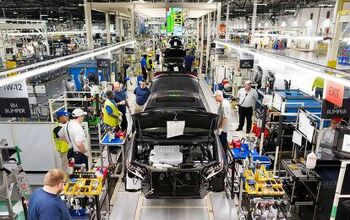Toyota Planning Long-range EV Using Solid-state Batteries by 2022

Toyota, the company that came out with the Prius in the 1990s and decided it had perfected the electric car, may be looking regain its EV advantage by 2022. It’s not something you’d expect to hear, considering Japan’s largest automaker has lagged behind in terms of competitive electric development for the last few years.
While its hybrid program got the drop on the competition, it subsequently favored hydrogen fuel cells over purely electric vehicles as the next automotive epoch — creating a bit of an industrial dinosaur.
Fortunately, Toyota has no shortage of muscles to flex. Once news broke that Toyota was earnestly considering electric R&D, everyone speculated it would be competitive at roughly the same time as other automakers. Not so. On Tuesday, Japanese newspaper Chunichi Shimbun reported Toyota has quietly upped its game to surpass them.
Earlier this year, Toyota filed a patent for solid-state lithium battery technology. While that isn’t noteworthy in itself, as numerous automakers have done the same, Reuters cited Chunichi Shimbun as claiming Toyota is working on bringing the technology to a long-range electric car in 2022 — several years earlier than most companies’ best estimates.
The advantages of solid-state batteries are numerous. It’s assumed they possess an energy density ideal for BEVs, likely offering greater range than what’s currently available. They also pose almost no fire risk, provide a longer lifespan, and can charge extremely quickly. While the Japanese report did not reference its sources, it alleged Toyota’s phantom model would achieve a complete charge “within minutes.”
Toyota’s new electric car is would be built on an entirely new platform for Japanese production in 2022 — which is, interestingly enough, right around the time the next Prius will be due.
Assuming Toyota comes out with a solid-state BEV before its rivals, it would have a huge advantage on the market. However, cost is unlikely to be among them. At present, the batteries are extremely expensive to produce. Toyota would not only have to hone the technology for cars but also find a way to construct, or source, the units without going bankrupt.
“There’s a pretty long distance between the lab bench and manufacturing,” said CLSA analyst Christopher Richter. “2022 is ages away, and a lot can change in the meantime.”
Toyota spokeswoman Kayo Doi told Reuters the automaker was unwilling to comment on specific product plans but added that it aimed to commercialize solid-state batteries by the early 2020s.
[Image: Toyota]

A staunch consumer advocate tracking industry trends and regulation. Before joining TTAC, Matt spent a decade working for marketing and research firms based in NYC. Clients included several of the world’s largest automakers, global tire brands, and aftermarket part suppliers. Dissatisfied with the corporate world and resentful of having to wear suits everyday, he pivoted to writing about cars. Since then, that man has become an ardent supporter of the right-to-repair movement, been interviewed on the auto industry by national radio broadcasts, driven more rental cars than anyone ever should, participated in amateur rallying events, and received the requisite minimum training as sanctioned by the SCCA. Handy with a wrench, Matt grew up surrounded by Detroit auto workers and managed to get a pizza delivery job before he was legally eligible. He later found himself driving box trucks through Manhattan, guaranteeing future sympathy for actual truckers. He continues to conduct research pertaining to the automotive sector as an independent contractor and has since moved back to his native Michigan, closer to where the cars are born. A contrarian, Matt claims to prefer understeer — stating that front and all-wheel drive vehicles cater best to his driving style.
More by Matt Posky
Latest Car Reviews
Read moreLatest Product Reviews
Read moreRecent Comments
- FreedMike Glad that one worked out for you!
- Urlik My issue with gigacasting is future repairabilty. It may save in manufacturing but all the savings will get eaten up by the consumers in increased insurance costs.
- Wjtinfwb Ford can produce all the training and instructional videos they want, and issue whatever mandates they can pursuant to state Franchise laws. The dealer principal and staff are the tip of the spear and if they don't give a damn, the training is a waste of time. Where legal, link CSI and feedback scores to allocations and financial incentives (or penalties). I'm very happy with my Ford products (3 at current) as I was with my Jeeps. But the dealer experience is as maddening and off-putting as possible. I refuse now to spend my money at a retailer who treats me and my investment like trash so I now shop for a dealer who does provide professional and courteous service. That led to the Jeep giving way to an Acura, which has not been trouble free but the dealer is at least courteous and responsive. It's the same owner group as the local Ford dealer so it's not the owners DNA, it's how American Honda manages the dealer interface with American Honda's customer. Ford would do well to adopt the same posture. It's their big, blue oval sign that's out front.
- ToolGuy Nice car."I’m still on the fill-up from prior to Christmas 2023."• This is how you save the planet (and teach the oil companies a lesson) with an ICE.
- Scrotie about 4 years ago there was a 1992 oldsmobile toronado which was a travtech-avis pilot car that had the prototype nav system and had a big antenna on the back. it sold quick and id never seen another ever again. i think they wanted like 13500 for it which was steep for an early 90s gm car.


































Comments
Join the conversation
"2022 is ages away" It's one vehicle model cycle from now, Mr. Richter. It's incredibly soon, and unless someone has something better in the pipeline, it will not be released by 2022. Anyway, the real gem of this technology is rapid charge because charge time is the real cause of range anxiety, not limited range. If a car could be recharged in 60 seconds, few people would care if it only had a 100mile range. However, charge times are also affected by the recharging infrastructure. I do not foresee rapid charging stations on every street corner by 2022 so this will affect Toyota's plans, regardless of how good solid state technology is.
TTAC: "The advantages of solid-state batteries are numerous. It’s assumed they possess an energy density ideal for BEVs, likely offering greater range than what’s currently available. They also pose almost no fire risk, provide a longer lifespan, and can charge extremely quickly. While the Japanese report did not reference its sources, it alleged Toyota’s phantom model would achieve a complete charge “within minutes.”" And the disadvantages are? C'mon, TTAC, lets have some balanced journalism here. It's your job. =======================